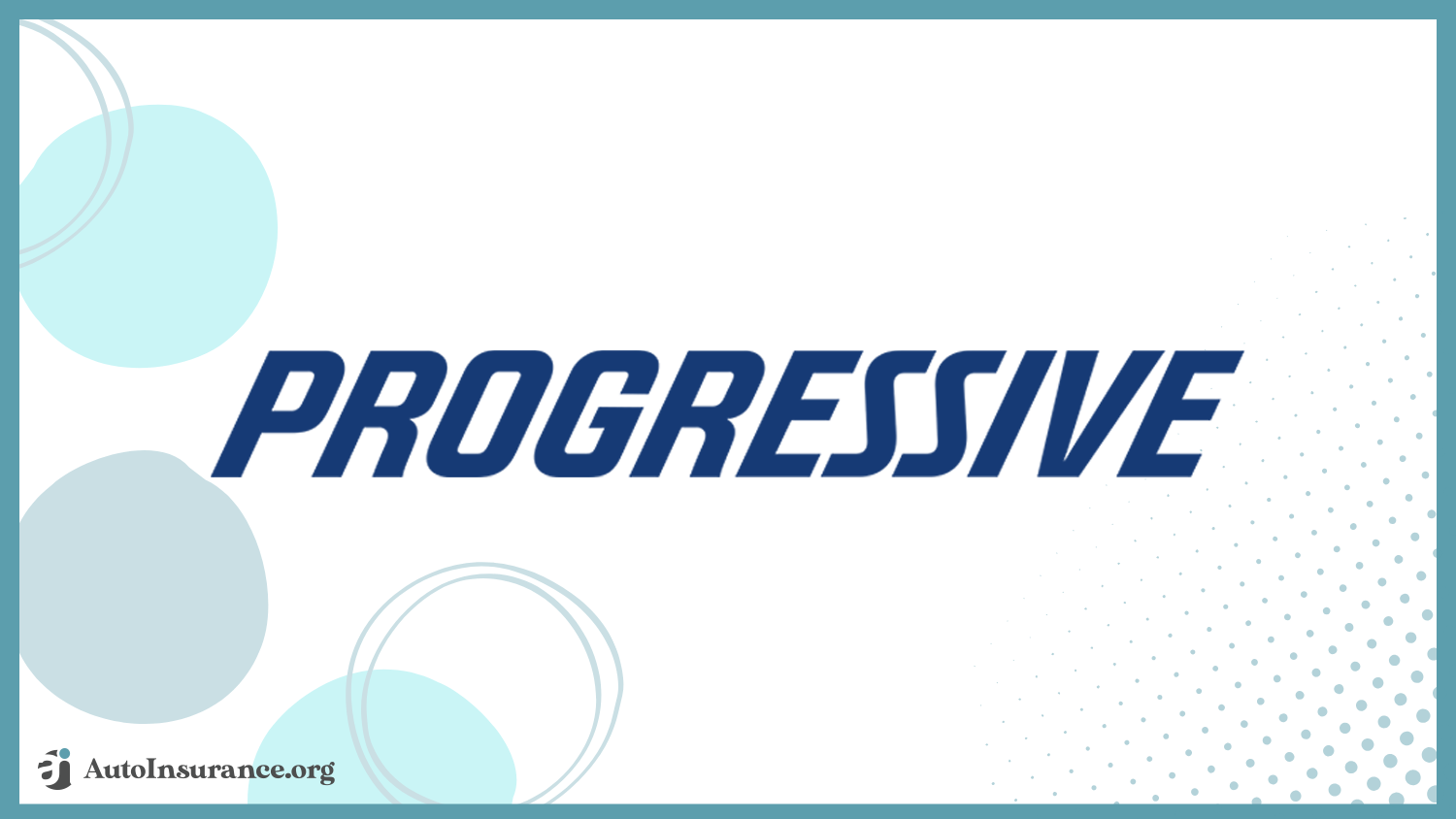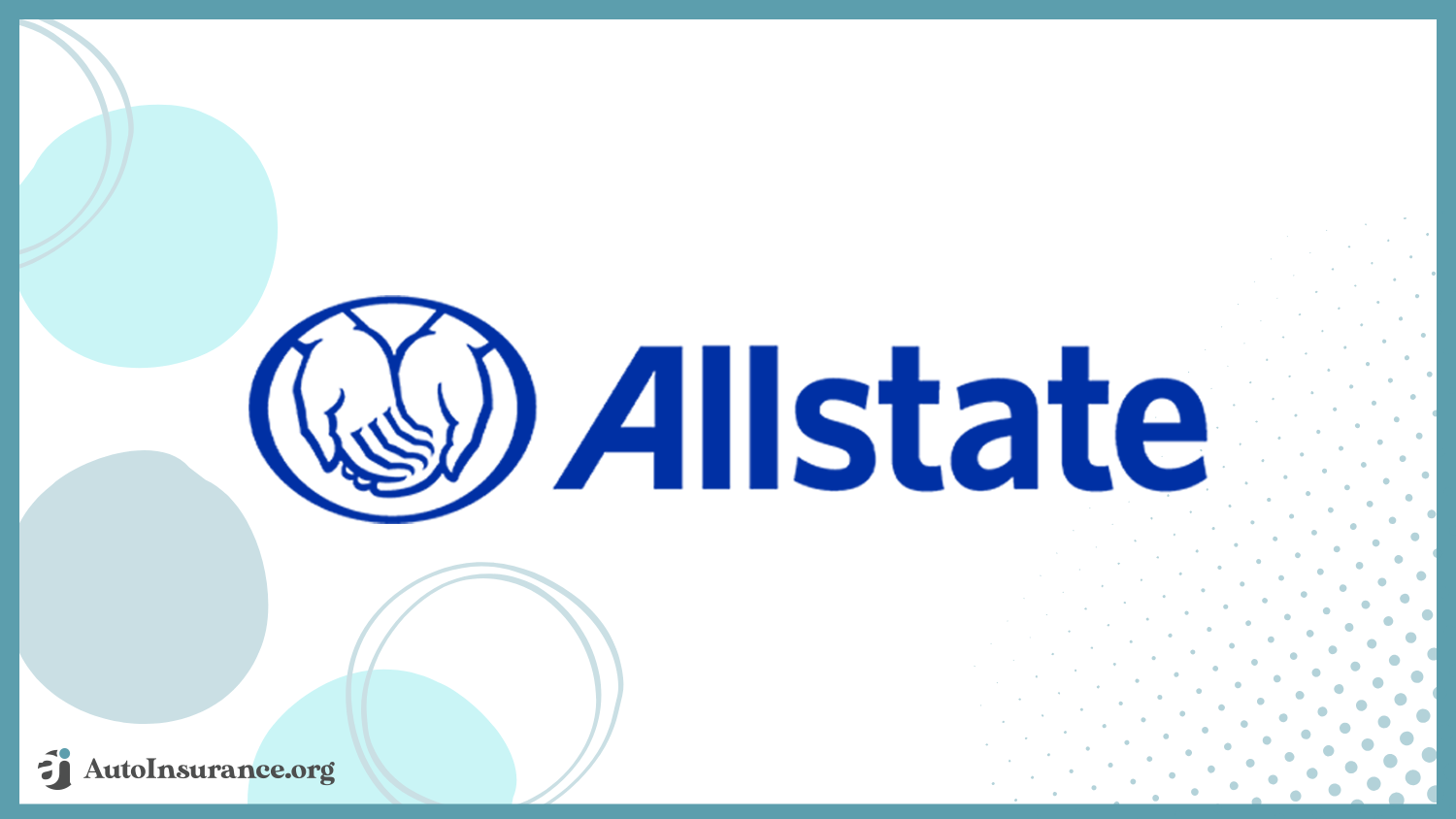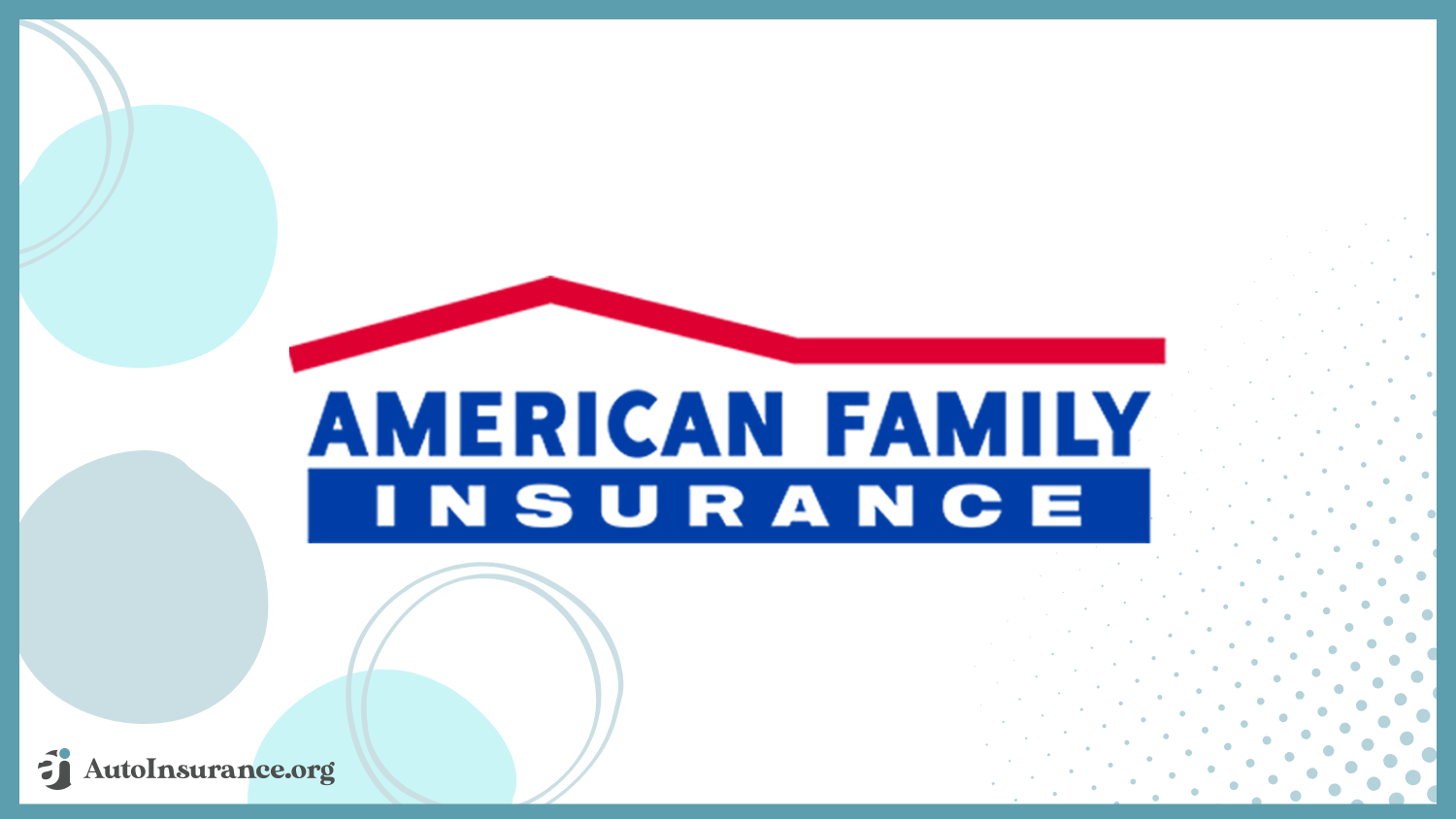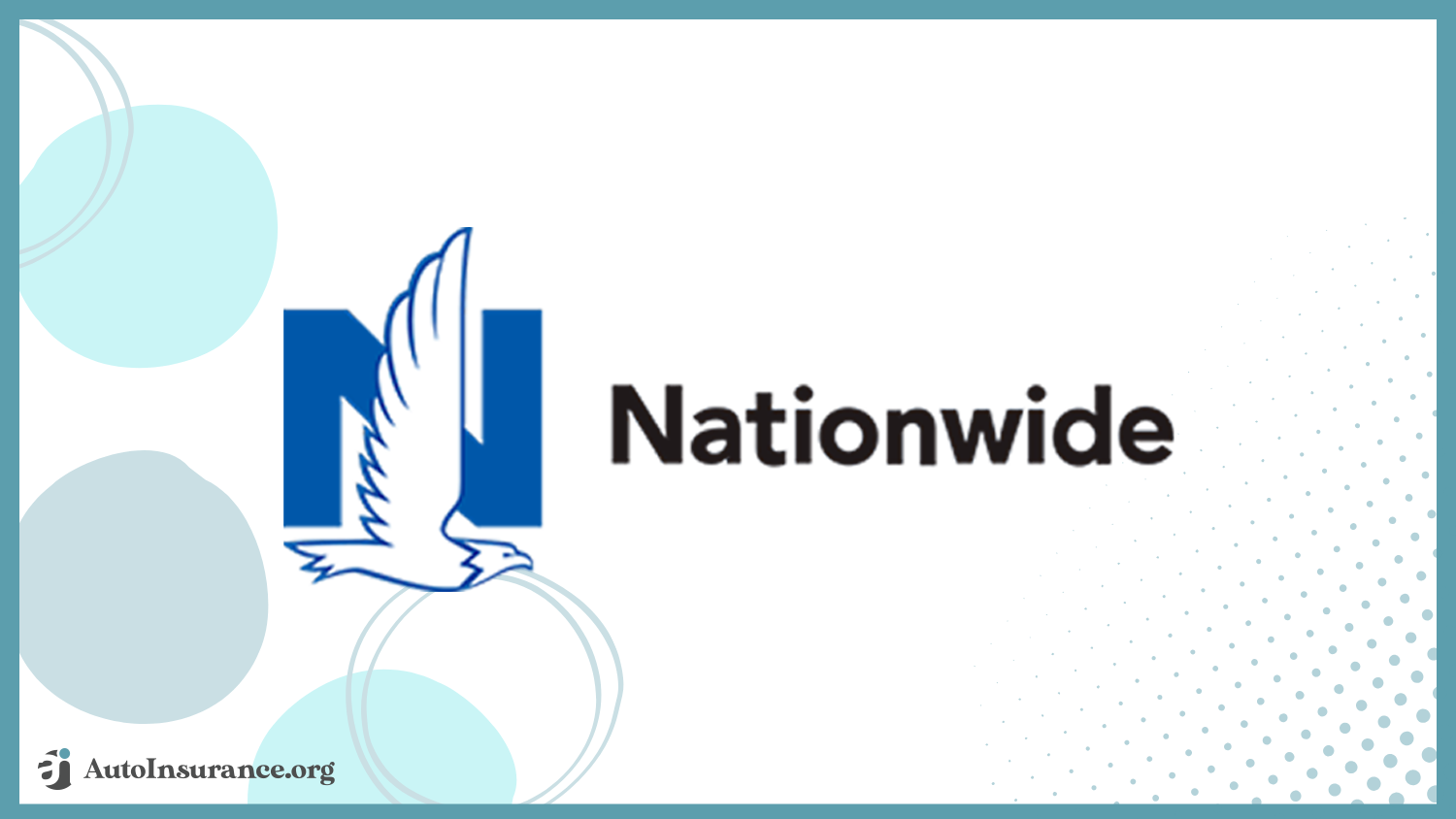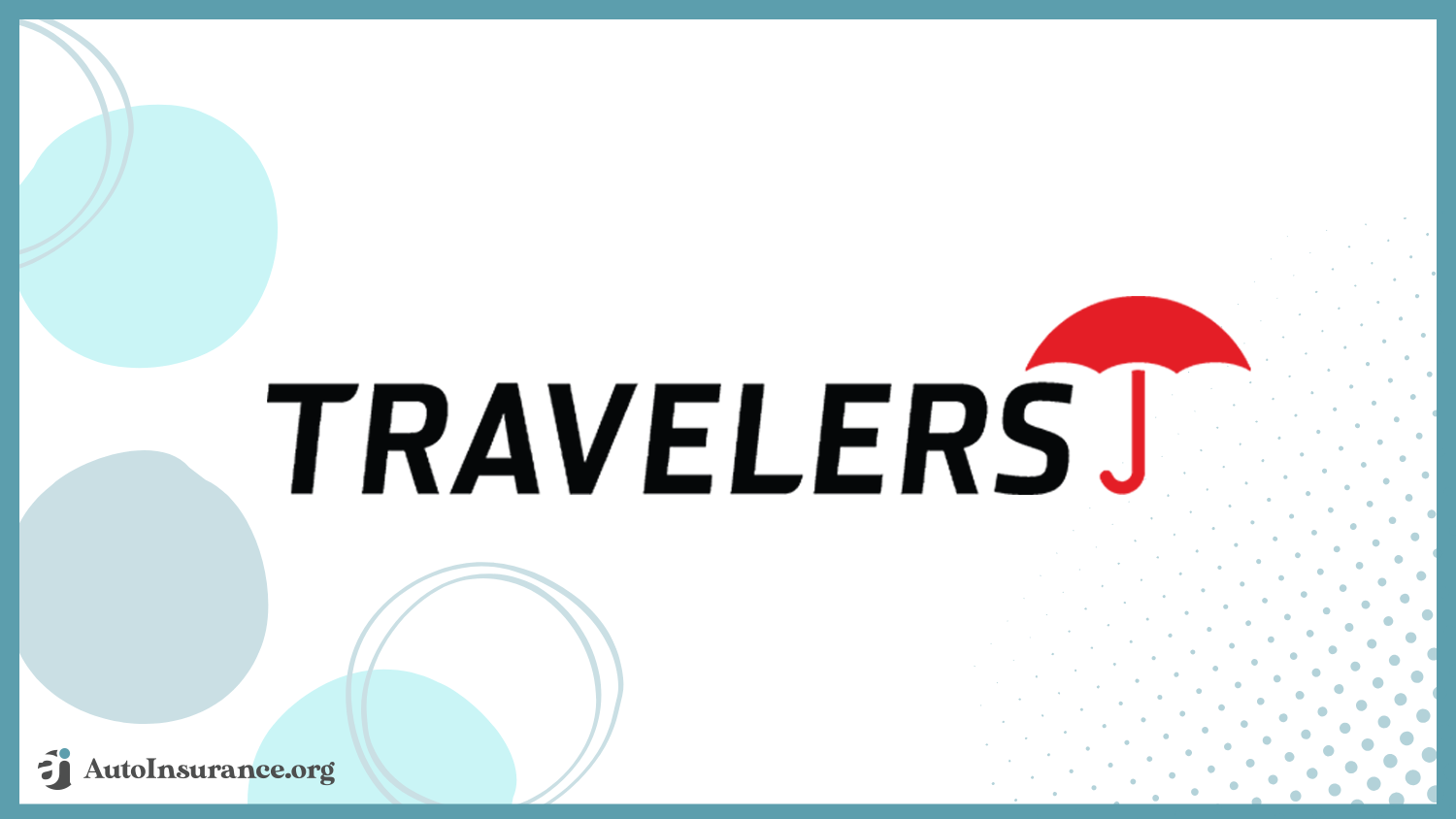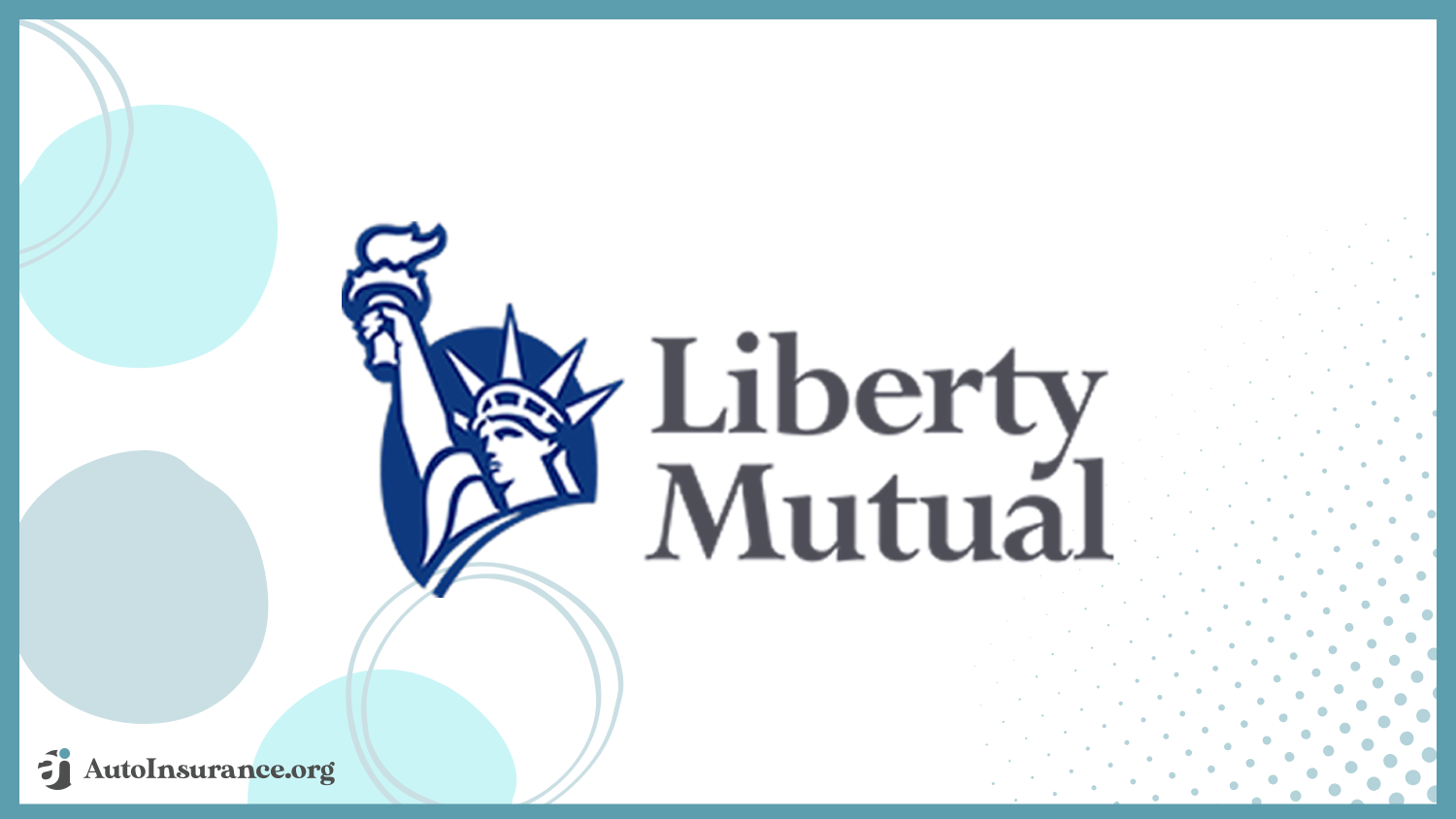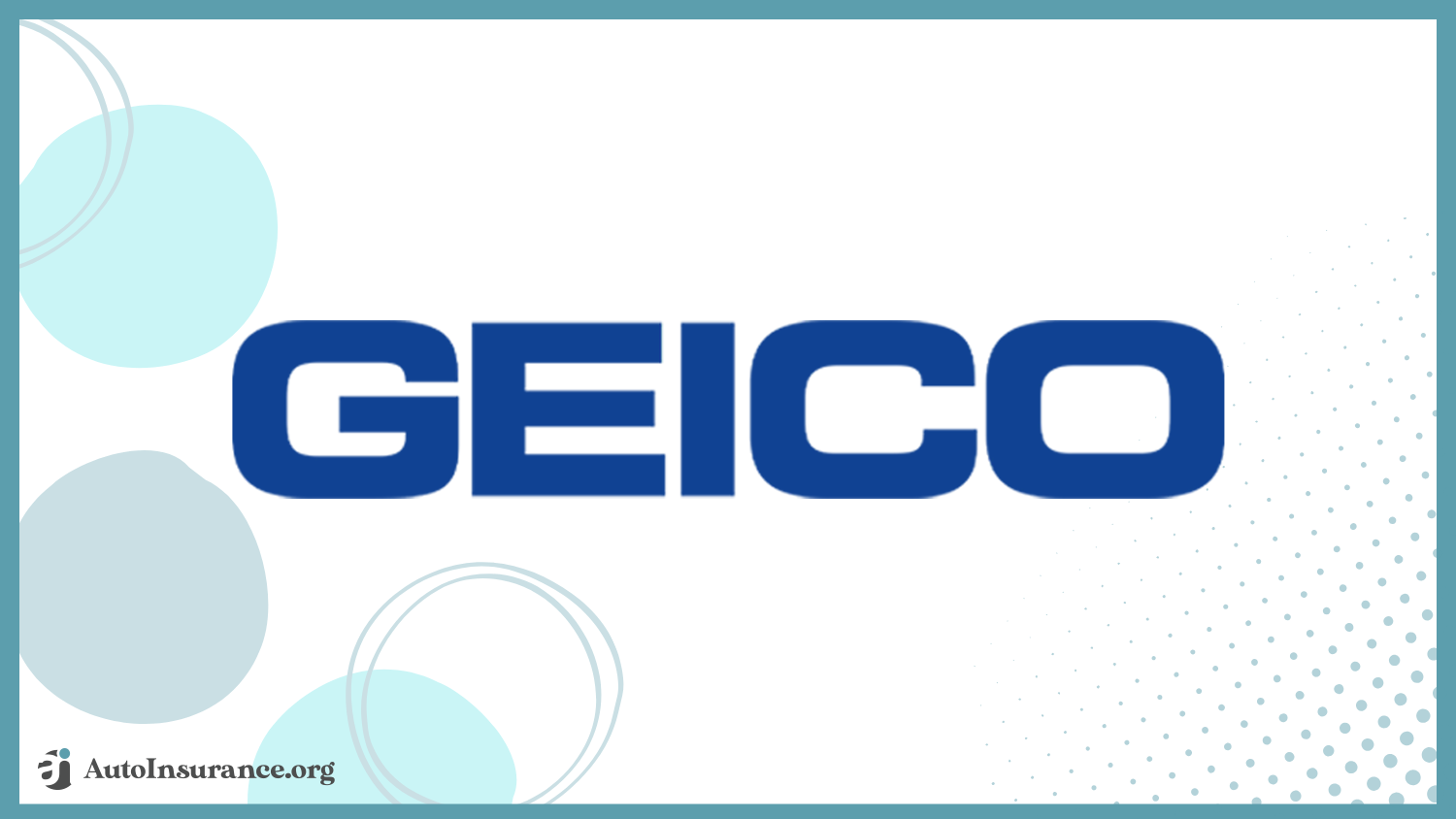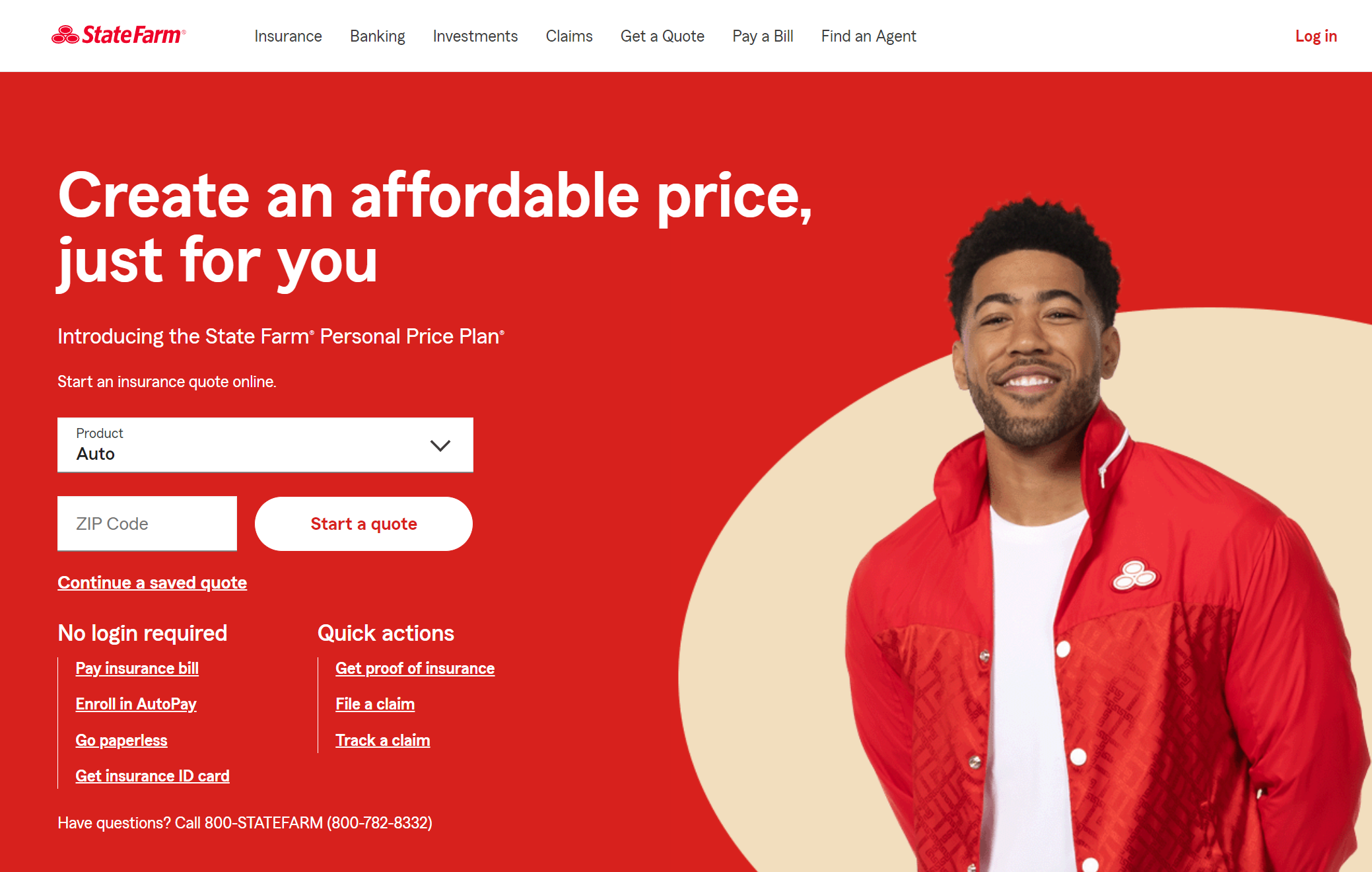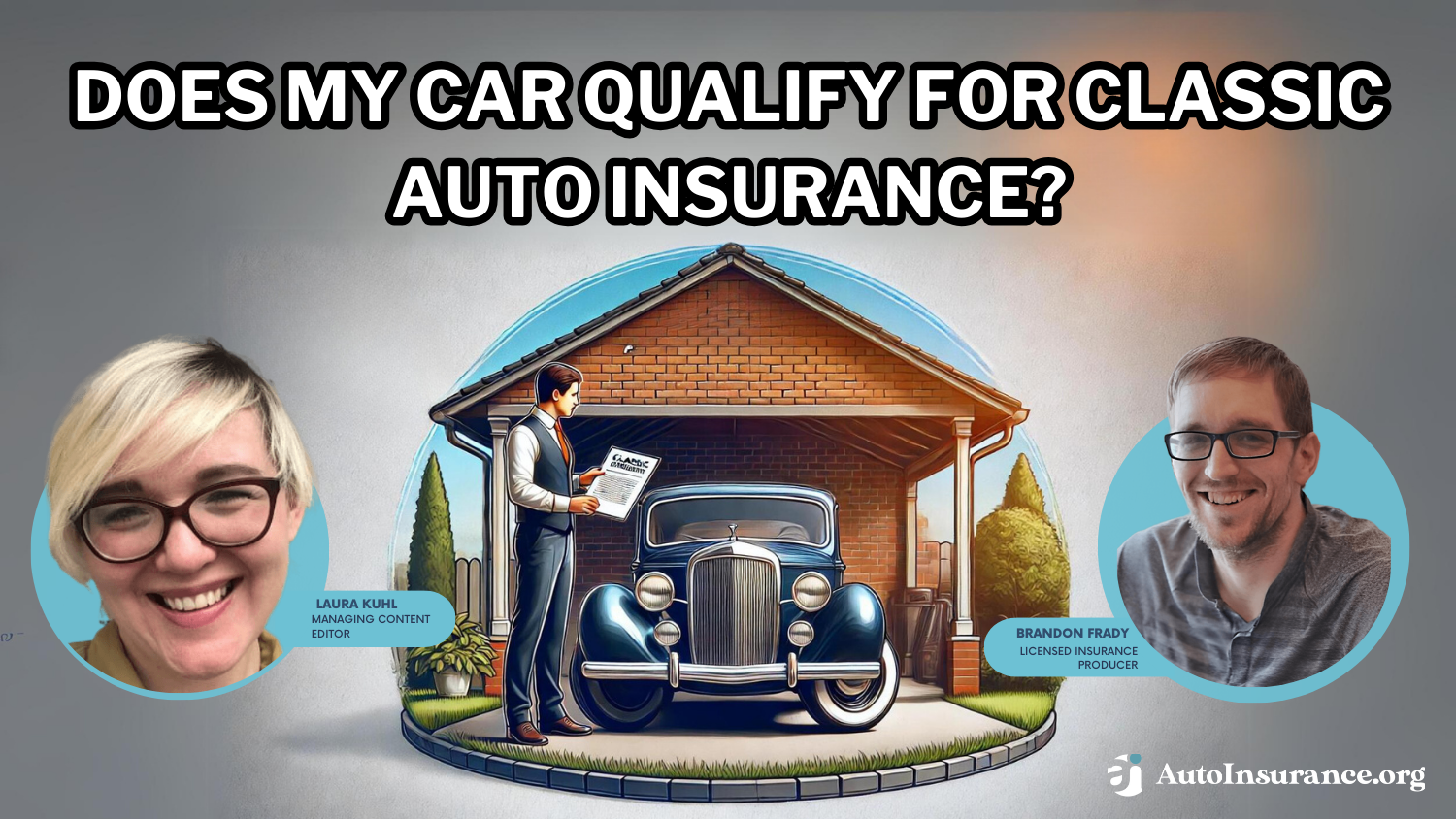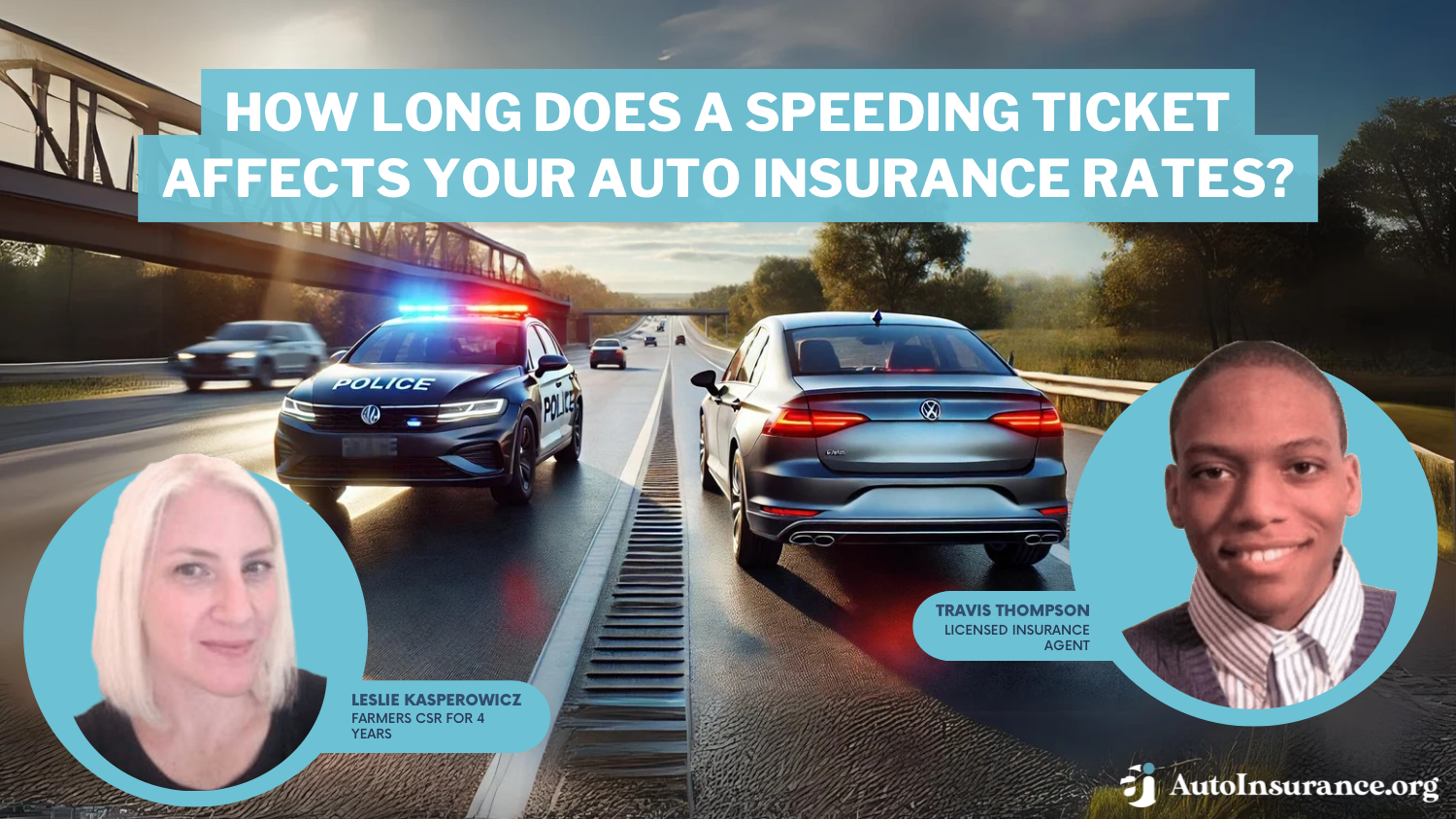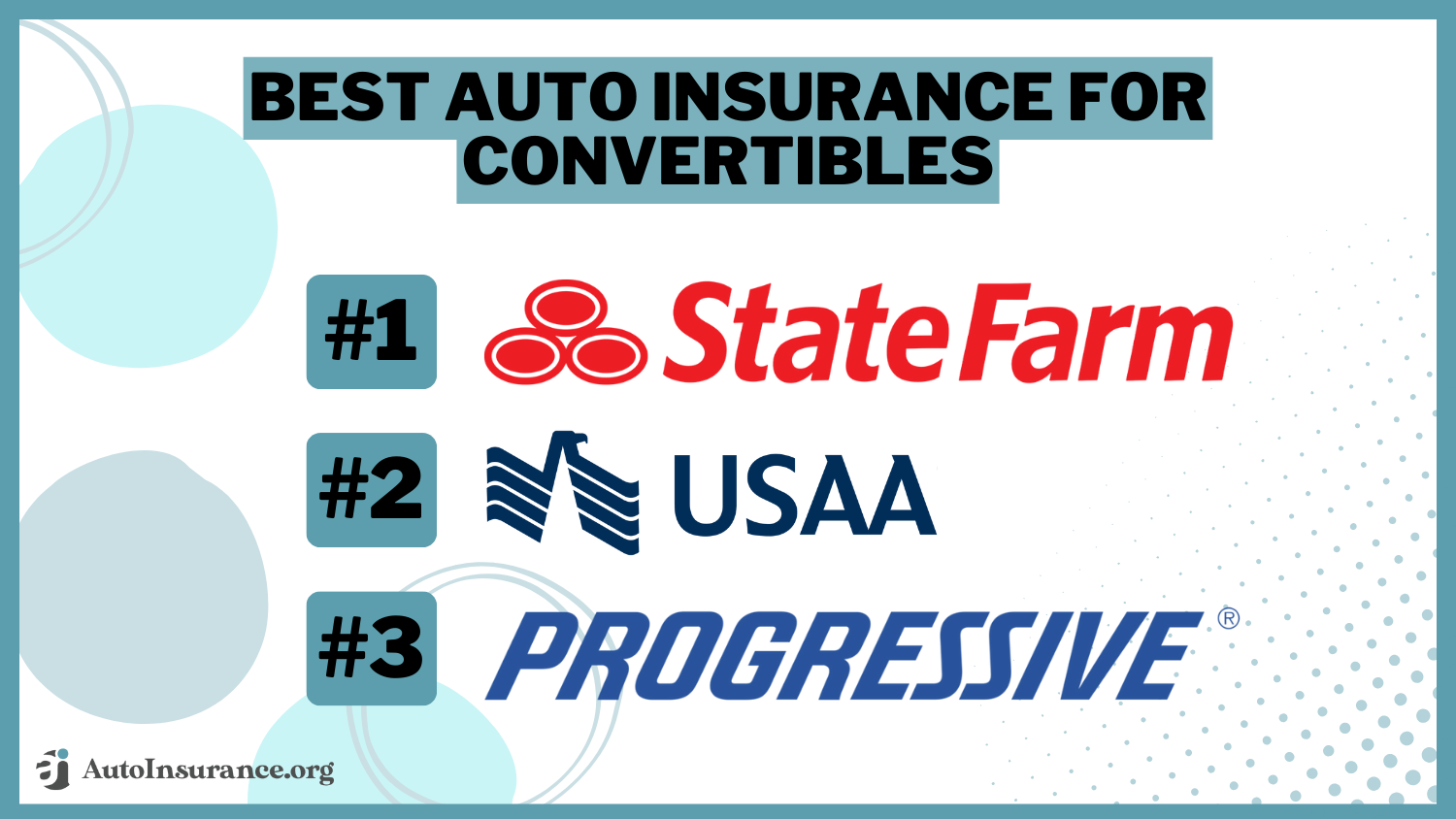Cheap Auto Insurance for 20-Year-Olds in 2026 (10 Companies with the Biggest Savings)
Finding cheap auto insurance for 20-year-olds can be a challenge, but our research finds that State Farm, Progressive, and Allstate offer the lowest rates. The average 20-year-old pays $130 per month for minimum insurance, but you can pay much less by shopping at the best auto insurance companies for 20-year-olds.
Read more Secured with SHA-256 Encryption




Table of Contents
Table of Contents


Insurance and Finance Writer
Merriya Valleri is a skilled insurance writer with over a decade of professional writing experience. Merriya has a strong desire to make understanding insurance an easy task while providing readers with accurate and up-to-date information. Merriya has written articles focusing on health, life, and auto insurance. She enjoys working in the insurance field, and is constantly learning in order to ...
Merriya Valleri


Licensed Insurance Agent
Brad Larson has been in the insurance industry for over 16 years. He specializes in helping clients navigate the claims process, with a particular emphasis on coverage analysis. He received his bachelor’s degree from the University of Utah in Political Science. He also holds an Associate in Claims (AIC) and Associate in General Insurance (AINS) designations, as well as a Utah Property and Casual...
Brad Larson
Updated August 2025
 18,155 reviews
18,155 reviewsCompany Facts
Avg. Monthly Rate for 20-Year-Old Drivers
A.M. Best Rating
Complaint Level
Pros & Cons
 18,155 reviews
18,155 reviews 13,283 reviews
13,283 reviewsCompany Facts
Avg. Monthly Rate for 20-Year-Old Drivers
A.M. Best Rating
Complaint Level
Pros & Cons
 13,283 reviews
13,283 reviews 11,638 reviews
11,638 reviewsCompany Facts
Avg. Monthly Rate for 20-Year-Old Drivers
A.M. Best Rating
Complaint Level
Pros & Cons
 11,638 reviews
11,638 reviewsThe cheapest auto insurance for 20-year-olds comes from State Farm, Progressive, and Allstate, especially for young drivers attending college full-time.
State Farm has the cheapest auto insurance costs for 20-year-olds at an average of $70 per month. Auto insurance company rates for new drivers can be pricy, but shopping at the best auto insurance companies for 20-year-olds can help you save.
Our Top 10 Company Picks: Cheap Auto Insurance for 20-Year-Olds
| Company | Rank | Monthly Rates | Good Student Discount | Best For | Jump to Pros/Cons |
|---|---|---|---|---|---|
| #1 | $70 | 25% | Cheap Rates | State Farm | |
| #2 | $90 | 10% | Budget Shopping | Progressive | |
| #3 | $100 | 35% | College Students | Allstate | |
| #4 | $115 | 20% | Young Volunteers | American Family | |
 | #5 | $120 | 15% | Deductible Savings | Nationwide |
 | #6 | $125 | 15% | Youth Discounts | Erie Insurance |
| #7 | $130 | 15% | Additional Discounts | Farmers | |
| #8 | $135 | 8% | Customer Service | Travelers | |
 | #9 | $140 | 15% | Add-on Availability | Liberty Mutual |
| #10 | $150 | 15% | Coverage Options | Geico |
Explore the companies with cheap auto insurance for 20-year-olds below, but keep in mind that average minimum rates are only one factor to look at. You should compare quotes and policy options to find the best auto insurance for 20-year-olds.
- The average 20-year-old pays $130 per month for minimum insurance
- Overall, State Farm has the cheapest auto insurance for 20-year-olds
- College students can save by finding good student discounts
#1 – State Farm: Cheapest Rates for 20-Year-Olds
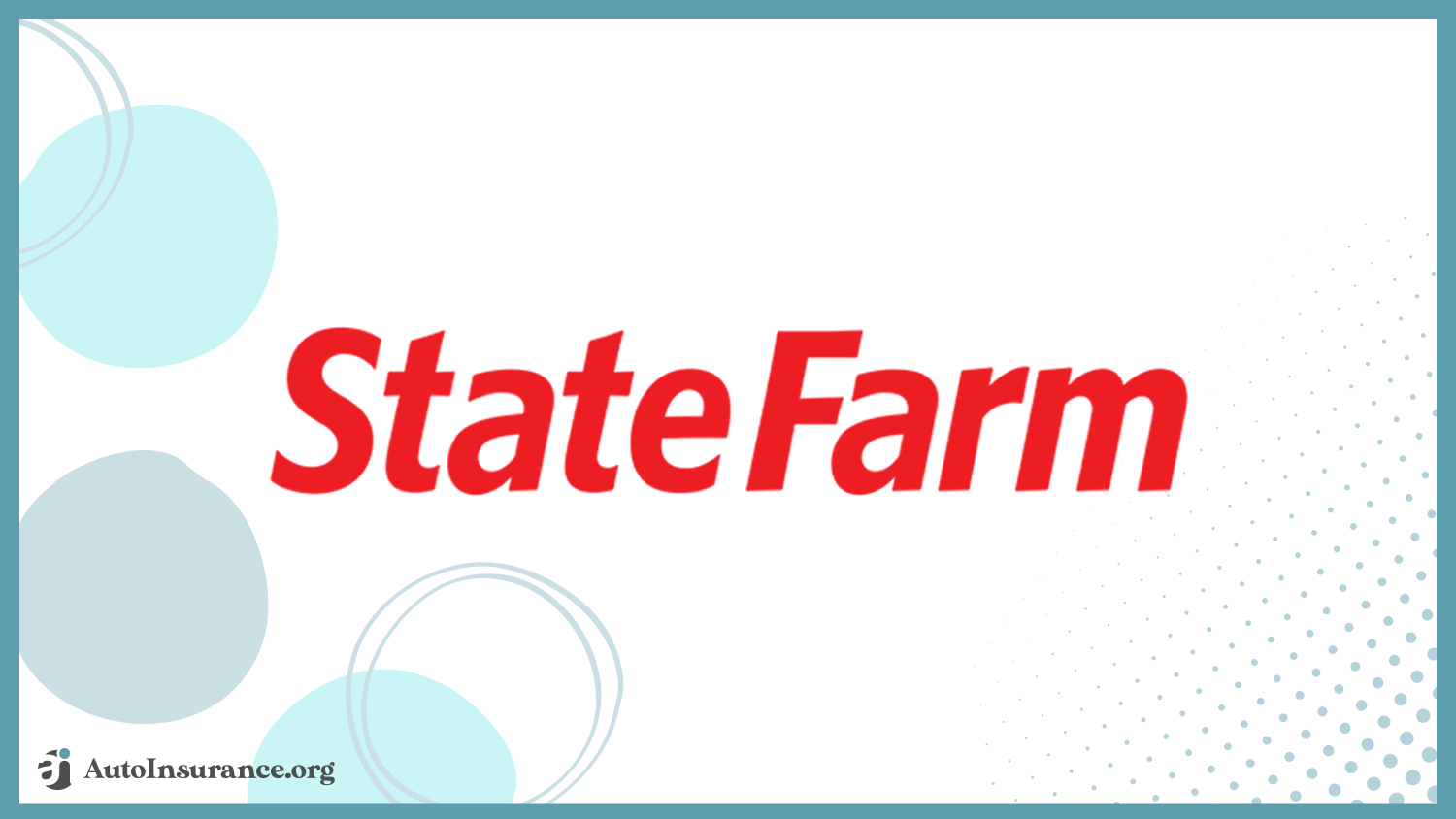
Pros
- Good student discounts: Full-time students under 25 who maintain at least a 3.0 GPA can save up to 25% on their insurance.
- Other discount availability: If you’re not in school, there are still plenty of State Farm auto insurance discounts to take advantage of, including safe driver, paperless documents, and multi-policy savings.
- Drive Safe and Save program: Drive Safe and Save is State Farm’s usage-based insurance (UBI) program that monitors driving behavior. Practicing safe habits can save you up to 30%. Learn more about the Drive Safe and Save program in our State Farm Auto Insurance Company Review.
- Rideshare coverage: For 20-year-olds making extra money on the side working for companies like Lyft and Uber, State Farm offers affordable rideshare insurance to make sure you’re always covered.
Cons
- Rates increase after an accident: Most insurance companies increase your rates after an at-fault accident. At State Farm, an at-fault accident can increase your rates by up to 59%.
- Limited online quoting: While you can get a basic policy quote from State Farm online, you might need to speak with an agent for more detailed information.
- Discount availability varies: Some State Farm discounts – including good student and Drive Safe and Save – are unavailable in every location.
Free Insurance Comparison
Compare Quotes From Top Companies and Save
Secured with SHA-256 Encryption
#2 – Progressive: Best for Tight Budgets
Pros
- Name Your Price tool: The Name Your Price tool helps drivers stick to a budget. Simply enter the amount you want to spend monthly on your insurance, and Progressive will give you a list of coverage options.
- Snapshot program: Snapshot is Progressive’s UBI program. Safe drivers save an average of $156 per month by enrolling in Snapshot.
- Discount availability: Progressive offers 13 discounts, including savings for customer loyalty, being a good student, safe driving, and signing up online. Explore other discount opportunities in our Progressive auto insurance review.
- Online tools: Many young drivers appreciate Progressive’s innovative online tools, which make signing up for and managing a policy a breeze. Progressive offers both a website and a mobile app.
- Wide range of coverage options: Aside from standard coverage options, Progressive offers a variety of specialty insurances and add-ons so you can customize your policy.
Cons
- Snapshot can increase rates: Many UBI programs guarantee that your rates won’t go up, but Snapshot users might see their premiums increase if they’re not practicing safe habits.
- Limited local agents: While Progressive has a great online presence, it can be difficult to find a local agent if you want face-to-face help.
- Limited coverage for some vehicles: Drivers with luxury or classic cars might need to find coverage elsewhere as Progressive offers limited coverage options.
#3 – Allstate: Best UBI Savings
Pros
- Drivewise program: Another chance for safe drivers to save, Allstate issues rebates every six months based on how well you drive.
- Student discounts: Allstate offers two ways for students to save: by maintaining a 3.0 or higher GPA or leaving your car at home when attending a college more than 100 miles away.
- Milewise: Drivers who put fewer miles than average should consider Milewise, Allstate’s pay-as-you-go insurance option. See if Milewise can help you save in our review of Allstate insurance.
- Accident forgiveness: By paying a little more per month, you can enroll in Allstate’s accident forgiveness. Allstate will forgive your first at-fault accident, so your rates don’t increase.
Cons
- Higher rates: Allstate is a trusted name in the car insurance industry, but that reputation comes with higher average rates, regardless of how old you are.
- Mixed claims handling scores: Although it typically receives positive customer reviews, many policyholders have reported dissatisfaction with how Allstate resolved their claims.
#4 – American Family: Best for Teen Driver Discounts
Pros
- KnowYourDrive program: American Family offers a 10% discount just for enrolling in the UBI program KnowYourDrive. Safe drivers can save up to 20% in total.
- Young Volunteer discount: There are several discounts aimed at helping young drivers save, but American Family’s Young Volunteer discount is the most unique. Earn this discount by volunteering at a non-profit for at least 40 hours a year. See what other discounts are offered in our American Family auto insurance review.
- Excellent customer service: American Family is known for its solid customer service experience, especially regarding how quickly it resolves claims.
Cons
- Higher rates for some drivers: Some people see higher premiums at American Family, especially high-risk drivers with at-fault accidents or DUIs on their record.
- Limited educational resources: Understanding car insurance can be difficult for young drivers, but American Family doesn’t offer as much support compared to its competitors.
Free Insurance Comparison
Compare Quotes From Top Companies and Save
Secured with SHA-256 Encryption
#5 – Nationwide: Best Vanishing Deductible Program
Pros
- SmartRide program: The SmartRide program offers one of the best UBI savings. As long as you drive safely, you can save up to 40%.
- Vanishing deductible: With this program, Nationwide rewards you with $100 off your deductible for every year you go without making a claim, up to $500 off.
- On Your Side Review: Nationwide offers a periodic review with an agent to ensure your policy meets your coverage and budget needs.
- Discounts for young drivers: Amongst the 11 discounts Nationwide offers are savings for good students. You can also earn discounts for things like safe driving, paying for your policy in full, and being a low-mileage driver.
Cons
- Mixed customer service reviews: Although some drivers are loyal Nationwide customers for life, many report dissatisfaction with the claims process. You can learn more about customer ratings in our Nationwide auto insurance review.
- Lacking online tools: While you can manage your policy on the site and use the mobile app to start a claim, many customers say Nationwide’s online tools are not as good as expected.
#6 – Erie Insurance: Best for Youth Discounts
Pros
- Youthful driver discount: While it doesn’t offer discounts for college students, all 20-year-olds have the opportunity to lower their rates with this discount.
- Pet coverage: If you frequently drive with a pet, Erie will cover veterinary bills in case your furry family member is injured in a covered accident.
- Rate lock feature: Sign up for Erie’s rate lock feature to protect yourself from most factors that would increase your rates, like moving to a new ZIP code or getting a speeding ticket.
Cons
- No usage-based insurance: If you’re interested in saving with a UBI program, you’ll need to shop somewhere else.
- Limited availability: Erie doesn’t operate in many states, meaning you can only buy a policy in 12 states. See if Erie sells policies in your state in our Erie auto insurance review.
#7 – Farmers: Best Discount Selection
Pros
- Signal app: You can enroll in Farmers’ UBI program by downloading the Signal app. You get an initial 5% discount for signing up, which can increase to 15% at your first policy renewal. Drivers under 25 might be eligible for an additional 10% savings.
- Rewards program: Farmers rewards safe driving with rewards points, which can be used to purchase merchandise and gift cards. Explore more details about the rewards program in our Farmers auto insurance review.
- Flexible payment options: Farmers makes it easy to select when you want to pay your monthly premium, giving you more freedom to manage your budget.
- Educational resources: Explore Farmers’ website or speak with a local agent to learn more about auto insurance, including which types of coverage might be best for you.
Cons
- Complex policies: Although Farmers offers educational resources, many customers report difficulty understanding how Farmers policies work.
- Limited coverage in some areas: Although Farmers offers a great selection of insurance, availability is limited in some states.
Free Insurance Comparison
Compare Quotes From Top Companies and Save
Secured with SHA-256 Encryption
#8 – Travelers: Best Customer Service
Pros
- IntelliDrive program: Save up to 30% on your insurance by enrolling in IntelliDrive, Travelers’ UBI program.
- Discount availability: Travelers offers 15 discounts, including savings for things like purchasing multiple policies, being a safe driver, and getting good grades.
- Excellent claims resolution: Travelers typically receives positive reviews for its claims resolution process, with most customers saying their claim was handled quickly. Learn more by reading our review of Travelers.
Cons
- Limited availability: Travelers only sells car insurance in 42 states.
- Coverage options lacking: Buying a standard policy from Travelers is simple, but you might need to go elsewhere if you want more coverage. For example, Travelers doesn’t sell rideshare insurance.
#9 – Liberty Mutual: Best for Add-on Selection
Pros
- Excellent add-on options: Liberty Mutual is one of the few companies to offer add-ons like new car and better car replacement coverage.
- RightTrack program: Enroll in Liberty Mutual’s RightTrack program to save up to 30% on your policy. However, RightTrack is currently only available in 41 states. See if RightTrack is right for you by reading our Liberty Mutual auto insurance review.
- Lifetime repair guarantee: As long as you use an in-network mechanic, Liberty Mutual offers a lifetime guarantee on any repairs made in claims.
- Tons of discounts: Liberty Mutual offers up to 17 ways to save on your policy, including discounts for safe driving, buying your policy online, and being a good student.
Cons
- Mixed customer reviews: While some customers are happy with their policies, others report that Liberty Mutual struggles with communication on claims issues.
- Small network of local agents: Some areas have fewer Liberty Mutual agents than others, which might make it more difficult to find personalized help.
- Rates can be high. Liberty Mutual isn’t usually the cheapest option for insurance. That’s particularly true for drivers with a DUI.
#10 – Geico: Best for Coverage Options
Pros
- Excellent discount options: With 16 discounts, most drivers can find a way to save on their insurance. Check out our Geico review to explore ways to save.
- Robust online tools: Geico makes it easy to sign up online for a new policy and manage your account. You can also use the mobile app to file claims and download digital ID cards.
- Diverse coverage options: Geico offers a few add-ons that can be hard to find elsewhere, like mechanical breakdown insurance.
- DriveEasy: Geico’s UBI program DriveEasy offers up to 25% savings for drivers who avoid behaviors like hard braking, rapid acceleration, and driving late at night.
Cons
- Young drivers can find lower rates elsewhere. Despite usually being one of the cheapest options on the market, Geico’s rates are a bit higher than average for young drivers.
- Claims handling falters in complex situations. Many customers report that complex situations make resolving their Geico claims harder, with poor communication mainly to blame.
Free Insurance Comparison
Compare Quotes From Top Companies and Save
Secured with SHA-256 Encryption
Auto Insurance Costs for 20-Year-Olds
Auto insurance premiums can range from very low to very high. The coverage options that you pick will dictate how much you’ll pay for your insurance in total.
Insurance rates stay high for young drivers until about the age of 25. It's vital to keep your driving record clean as a young driver, or your rates will stay high.Dani Best Licensed Insurance Producer
There’s no telling how much you’ll pay for insurance when you’re shopping for a policy on your own at the age of 20. Teens that 16 to 19 pay the most for insurance, but most of the time they are on their parents’ policy until at least the age of 18. When you branch off, it’s going to cost you a lot.
In fact, rates for 20-year-olds are, on average, 41% higher than the rates for 30-year-old drivers if all other factors are the same.
Keep in mind that the average rates for 20-year-old females will often be lower than that of 20-year-old male drivers. That’s because female drivers are considered slightly lower risk than males due to risky driving behavior.
Understanding Auto Insurance Rates for 20-Year-Old
You’re not in your teens anymore but that doesn’t mean that you automatically fall into a low-risk driver class. Insurance rates for different driver types can vary significantly, and most insurance look at people in their teens and early twenties as high-risk drivers.
20-year-old drivers are still considered high-risk drivers for another five years if they were licensed in their teens. According to accident data, teens are most reckless when they are under 19 but drivers in their twenties still fall into the second-riskiest class.
Because they still have limited experience behind the wheel, most auto insurance companies still consider 20-year-old drivers at risk for motor vehicle crashes.
Staying on a Parent or Guardian’s Policy
You might not have to buy your own auto insurance right away just because you’re legally an adult. If you live with your parents, you may be able to stay on your parents’ auto insurance policy as a driver.
Adding a teen or young adult driver to an existing policy is one of the best ways for a parent or guardian to help young people save. The average 20-year-old can save up to 50% by joining a family plan.Ty Stewart Licensed Insurance Agent
Usually, insurers will allow this when you’re in their home or you’re going to college and you’re still a dependent. If you buy your own car, it doesn’t mean that you can’t add the car to your parents’ insurance.
In fact, if you can be added to your parents’ insurance, it will more likely help keep your annual premium low. Try to think of it as having a joint bank account with your mom and dad, versus having one of your own. If you can join forces with your parents on a joint bank account, you avoid a lot of the hassle of having two accounts, like asking yourself, can you deposit a check for someone else?
But when coming together under one policy, the process becomes smoother, and you can enjoy the benefits of lower premiums and few problems.
Some carriers don’t even have this requirement as long as you’re a blood relative in the home.
It’s best to stick with your parents for as long as you can. When you have no other option but to buy your own insurance at 20, it’s your duty to shop around and do as much homework as you can on pricing.
Free Insurance Comparison
Compare Quotes From Top Companies and Save
Secured with SHA-256 Encryption
Auto Insurance Requirements
Buying insurance isn’t something you can put off for very long. If you want to own a vehicle, you’re going to have to buy at least some insurance on the car as soon as you become the owner.
Since 49 of the states in the country have very strict mandatory insurance or financial responsibility laws, you’ll have to familiarize yourself with the law.
Anyone who is buying their first car in their late teens and their early 20’s needs to learn about the mandatory motor vehicle insurance laws so that they are ready to shop for coverage as soon as they start shopping for a vehicle.
The problem with brushing up on laws is that you need to know where you’ll be living because every state has its own coverage requirements.
Types of Auto Insurance for 20-Year-Olds
If you’re wondering how much coverage you’re going to have to have when you buy insurance, there’s not one single way to answer this. If you’re living in a tort state with a very low-limit requirement, you might only need liability auto insurance coverage. In these states, the average premiums are low.
There are states where average premiums are much higher than national averages simply because all of the residents must carry more coverage at higher limits. This usually happens in a no-fault state where you’re required to buy coverage for yourself.
The most common requirements include:
- Bodily injury liability: Bodily injury liability insurance pays when you’re liable for injuries to others in an auto-related accident
- Property damage liability: Property damage liability insurance pays when you’re liable for damage to someone else’s property in an auto-related accident
- Medical Payments: Medical payments covers your own immediate and reasonable medical expenses after you’re injured in an auto-related accident (only required in some tort states)
- Uninsured Motorist Protection: Uninsured motorist insurance pays for your medical expenses and rehabilitation costs if you’re involved in an accident with someone who has no insurance (only required in some states)
- Personal injury protection: Personal injury protection insurance pays for your own medical bills, lost income, and other related expenses if you live in a no-fault state
Determining How Much Coverage You Need
When you’re a 20-year-old driver, it’s easy to get confused by all of the terminologies you’ll run into. You’re not going to become an expert in insurance lingo right away and many never do.
The best thing to do when you’re looking for the right level of protection is to do your research.
One of the drawbacks of high school curriculum is that there really is no requirement in a place where you’re required to learn the ins and outs of insurance. You’re left fending for yourself or leaning on your parents to help you do the heavy lifting.
If you’re not sure how much coverage you’re going to need, here are a few tips that can help you:
- Most experts recommend that all drivers carry at least $100,000 per person, $300,000 per accident, and $100,000 per accident in liability insurance to protect assets and future income.
- If you own a home or other valuable assets, you’ll need higher limits and you may need a personal liability umbrella for gap protection.
- If you’re going to lease or finance a car, the finance company is going to require you to carry comprehensive auto insurance and collision auto insurance.
- If your vehicle is paid off and it is worth less than $2,000, you may want to go without full coverage.
- For paid-off cars, the common rule of thumb is to drop collision when the collision premiums are more than 10% of the vehicle’s value.
- Carry Uninsured Motorist Protection if you live in an area with a high rate of uninsured drivers.
Make sure your coverage meets your state’s liability limits.
You could contact all types of carriers directly, but entering your information over and over can be time-consuming.
Or, you could spend your time wisely and get online quotes all at once. Use a quoting tool, enter your information, and get directed to instant quotes.
The best way to find affordable insurance rates is to compare auto insurance quotes from multiple auto insurance companies.
Enter your ZIP code below to find the cheapest car insurance rates that work with your budget today.
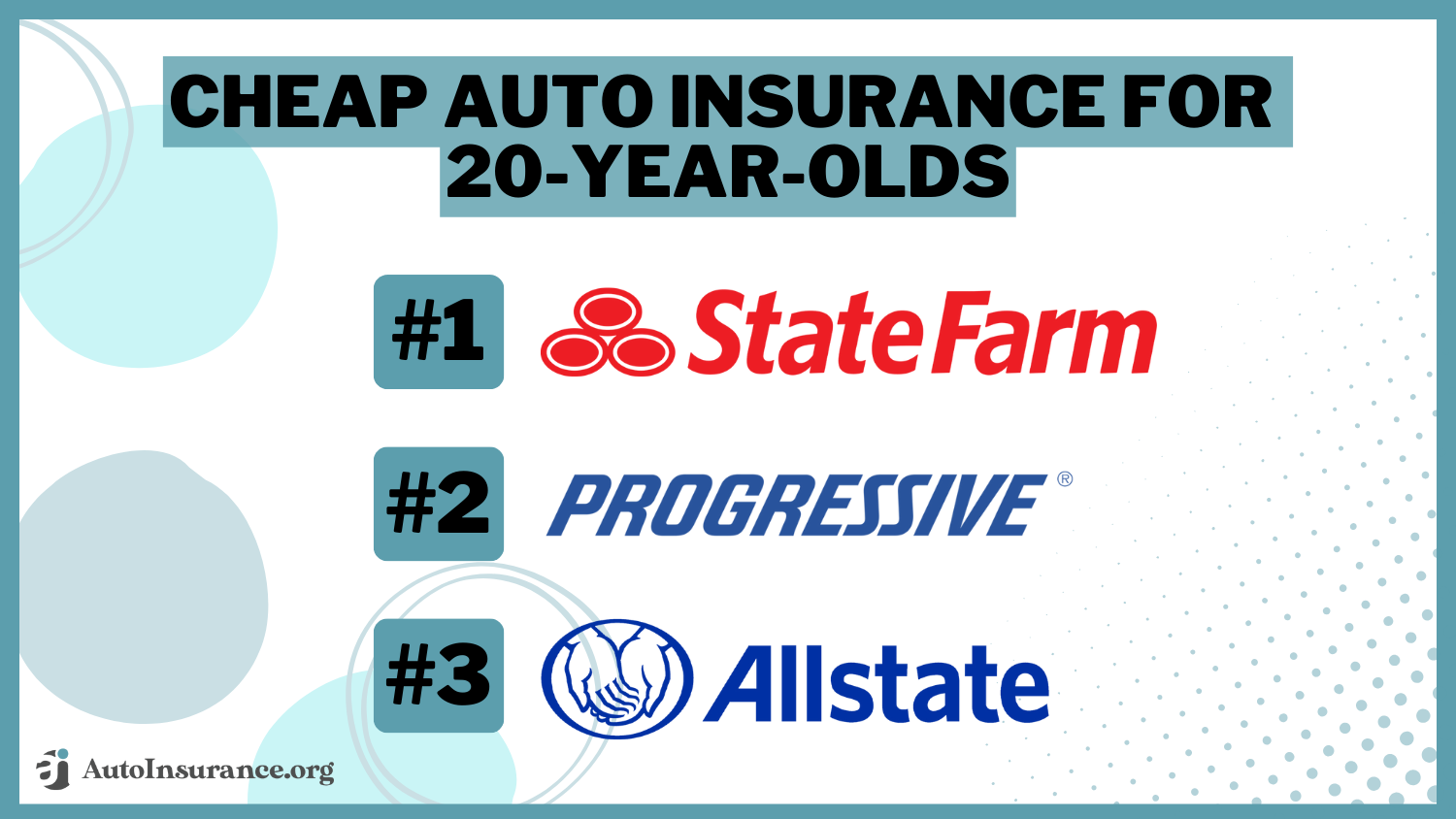
Frequently Asked Questions
Can a 20-year-old get their own auto insurance policy?
Yes, a 20-year-old can typically get their own auto insurance policy. Most insurance companies offer coverage to young adults who are 20 years old or older. However, specific eligibility requirements and regulations may vary depending on the insurance provider and state laws.
How much does auto insurance cost for a 20-year-old?
The cost of auto insurance for 20-year-olds can vary based on several factors. These factors include driving record, location, type of vehicle, coverage options, and the insurance company’s underwriting guidelines. While insurance premiums for young adults tend to be higher due to their limited driving experience, rates may vary significantly. It’s advisable to obtain quotes from multiple insurance providers to compare rates and find the most affordable option.
Are there any discounts available for 20-year-old drivers?
Yes, there are often discounts available for 20-year-old drivers. Insurance companies may offer discounts for factors such as maintaining good grades, completing safe driving courses, having a clean driving record, and bundling auto insurance with other policies. It’s recommended to inquire with insurance providers about any available discounts that may help lower the insurance premium.
Can a 20-year-old be added to their parent’s auto insurance policy?
In most cases, a 20-year-old can be added to their parent’s auto insurance policy. Adding a young adult to an existing policy is often a cost-effective option compared to obtaining a separate policy. However, it’s important to inform the insurance provider about the new driver to ensure appropriate coverage.
What type of coverage do 20-year-olds need?
20-year-olds typically need the same types of coverage as any other driver. This includes liability coverage (to cover damages to others in an accident), collision coverage (to cover damages to their own vehicle in an accident), and comprehensive coverage (to cover non-collision related damages like theft or vandalism). The coverage limits can be adjusted based on individual needs and budget.
Can a 20-year-old with a learner’s permit get auto insurance?
Yes, a 20-year-old with a learner’s permit can usually obtain auto insurance. While they may not be the primary policyholder, they can be added to an existing policy or have a separate policy under a parent or guardian’s name. Insurance providers may have specific requirements for drivers with learner’s permits, so it’s important to check with them.
What factors affect the cost of auto insurance for 20-year-olds?
Getting cheap auto insurance for young adult drivers depends on several factors. These include the individual’s driving record, location, type of vehicle, coverage options selected, any applicable discounts, and the insurance company’s underwriting guidelines. Each insurance provider assesses risk differently, so rates may vary.
How can 20-year-olds lower their auto insurance rates?
There are several ways for how to get cheap auto insurance for 20-year-olds. These include maintaining a clean driving record, completing driver education courses, selecting a safe and low-risk vehicle, choosing higher deductibles, inquiring about available discounts, and comparing quotes from multiple insurance providers. Shopping around and exploring different options can help find more competitive rates.
Are there discounts for 20-year-old college students?
Most major insurance companies offer discounts for auto insurance for 20-year-old college students. The most common discounts offered for students are for maintaining good grades and leaving your car at home while you attend a school 100 or more miles away.
What are the best auto insurance companies for 20-year-olds?
Many factors affect which company has the best car insurance for 20-year-olds, but State Farm, Progressive, and Allstate tend to have the cheapest rates.
Get a FREE Quote in Minutes
Insurance rates change constantly — we help you stay ahead by making it easy to compare top options and save.

